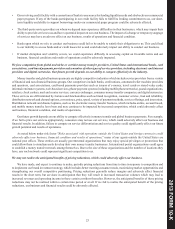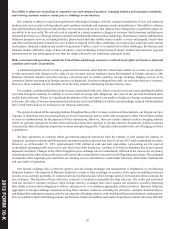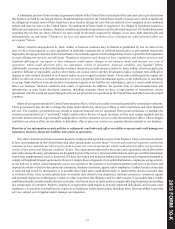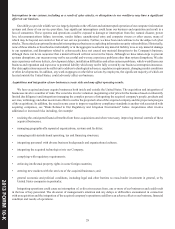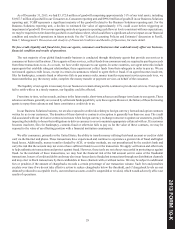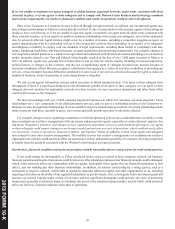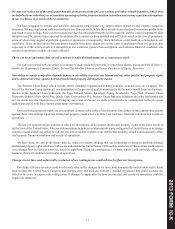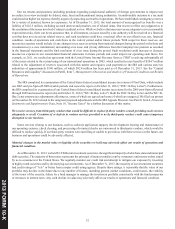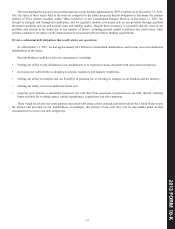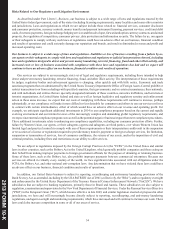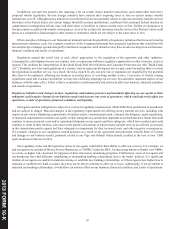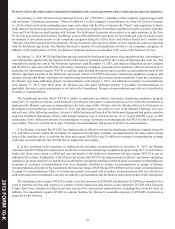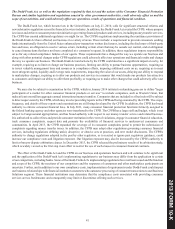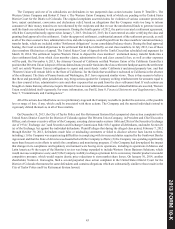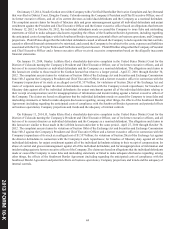Western Union 2013 Annual Report Download - page 144
Download and view the complete annual report
Please find page 144 of the 2013 Western Union annual report below. You can navigate through the pages in the report by either clicking on the pages listed below, or by using the keyword search tool below to find specific information within the annual report.
2013 FORM 10-K
34
Risks Related to Our Regulatory and Litigation Environment
As described under Part I, Item 1, Business, our business is subject to a wide range of laws and regulations enacted by the
United States federal government, each of the states (including licensing requirements), many localities and many other countries
and jurisdictions. Laws and regulations to which we are subject include those related to: financial services, consumer disclosure
and consumer protection, currency controls, money transfer and payment instrument licensing, payment services, credit and debit
cards, electronic payments, foreign exchange hedging services and the sale of spot, forward and option currency contracts, unclaimed
property, the regulation of competition, consumer privacy, data protection and information security. The failure by us, our agents
or their subagents to comply with any such laws or regulations could have an adverse effect on our business, financial condition
and results of operations and could seriously damage our reputation and brands, and result in diminished revenue and profit and
increased operating costs.
Our business is subject to a wide range of laws and regulations. Liabilities or loss of business resulting from a failure by us,
our agents or their subagents to comply with laws and regulations and regulatory or judicial interpretations thereof, including
laws and regulations designed to detect and prevent money laundering, terrorist financing, fraud and other illicit activity, and
increased costs or loss of business associated with compliance with those laws and regulations has had and we expect will
continue to have an adverse effect on our business, financial condition and results of operations.
Our services are subject to an increasingly strict set of legal and regulatory requirements, including those intended to help
detect and prevent money laundering, terrorist financing, fraud, and other illicit activity. The interpretation of those requirements
by judges, regulatory bodies and enforcement agencies is changing, often quickly and with little notice. Economic and trade
sanctions programs that are administered by the United States Treasury Department's Office of Foreign Assets Control prohibit or
restrict transactions to or from or dealings with specified countries, their governments, and in certain circumstances, their nationals,
and with individuals and entities that are specially-designated nationals of those countries, narcotics traffickers, and terrorists or
terrorist organizations. As United States federal and state as well as foreign legislative and regulatory scrutiny and enforcement
action in these areas increase, we expect that our costs of complying with these requirements will continue to increase, perhaps
substantially, or our compliance will make it more difficult or less desirable for consumers and others to use our services or for us
to contract with certain intermediaries, either of which would have an adverse effect on our revenue and operating profit. For
example, we anticipate significant additional investments in 2014 in our compliance programs based on the current and rapidly
evolving environment and our internal reviews of the increasingly complex and demanding global regulatory requirements, and
we expect incremental compliance program costs as well as the potential negative business impact from new compliance procedures.
These additional investments relate to enhancing our compliance capabilities, including our consumer protection efforts. Further,
failure by Western Union, our agents, or their subagents (agents and subagents are third parties, over whom Western Union has
limited legal and practical control) to comply with any of these requirements or their interpretation could result in the suspension
or revocation of a license or registration required to provide money transfer, payment or foreign exchange services, the limitation,
suspension or termination of services, loss of consumer confidence, the seizure of our assets, and/or the imposition of civil and
criminal penalties, including fines and restrictions on our ability to offer services.
We are subject to regulations imposed by the Foreign Corrupt Practices Act (the "FCPA") in the United States and similar
laws in other countries, such as the Bribery Act in the United Kingdom, which generally prohibit companies and those acting on
their behalf from making improper payments to foreign government officials for the purpose of obtaining or retaining business.
Some of these laws, such as the Bribery Act, also prohibit improper payments between commercial enterprises. Because our
services are offered in virtually every country of the world, we face significant risks associated with our obligations under the
FCPA, the Bribery Act, and other national anti-corruption laws. Any determination that we have violated these laws could have
an adverse effect on our business, financial condition and results of operations.
In addition, our United States business is subject to reporting, recordkeeping and anti-money laundering provisions of the
Bank Secrecy Act, as amended, including by the USA PATRIOT Act of 2001 (collectively, the "BSA"), and to regulatory oversight
and enforcement by the United States Department of the Treasury Financial Crimes Enforcement Network ("FinCEN"). We have
subsidiaries that are subject to banking regulations, primarily those in Brazil and Austria. These subsidiaries are also subject to
regulation, examination and supervision by the New York Department of Financial Services. Under the Payment Services Directive
("PSD") in the European Union ("EU"), which became effective in late 2009, and similar legislation enacted or proposed in other
jurisdictions, we have and will increasingly become directly subject to reporting, recordkeeping, and anti-money laundering
regulations, and agent oversight and monitoring requirements, which have increased and will continue to increase our costs. These
laws could also increase competition in some or all of our areas of service.



